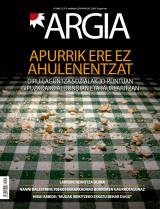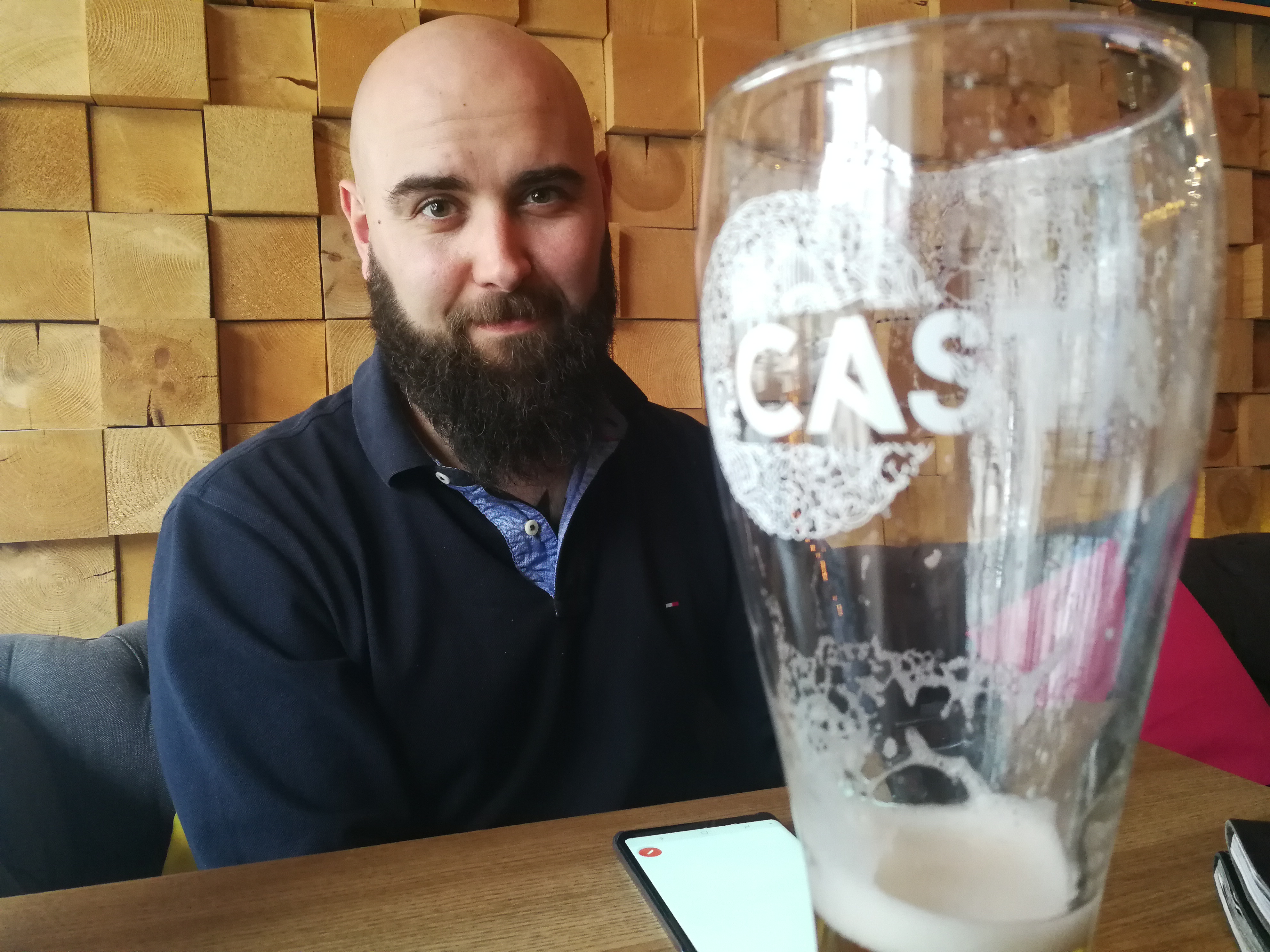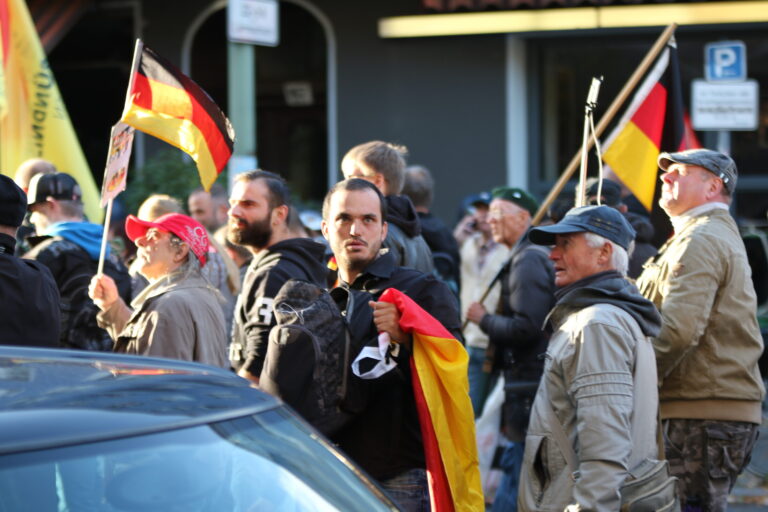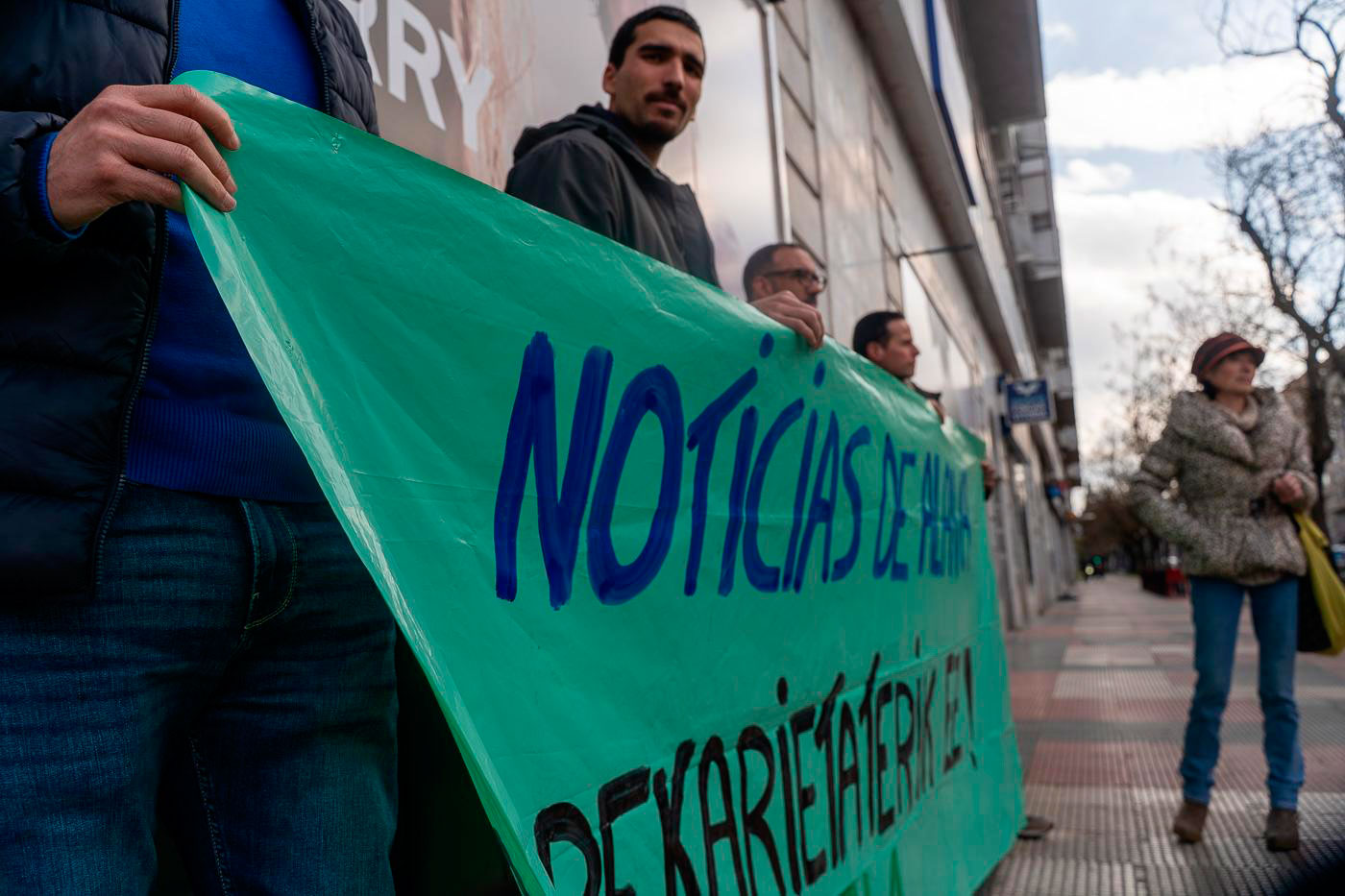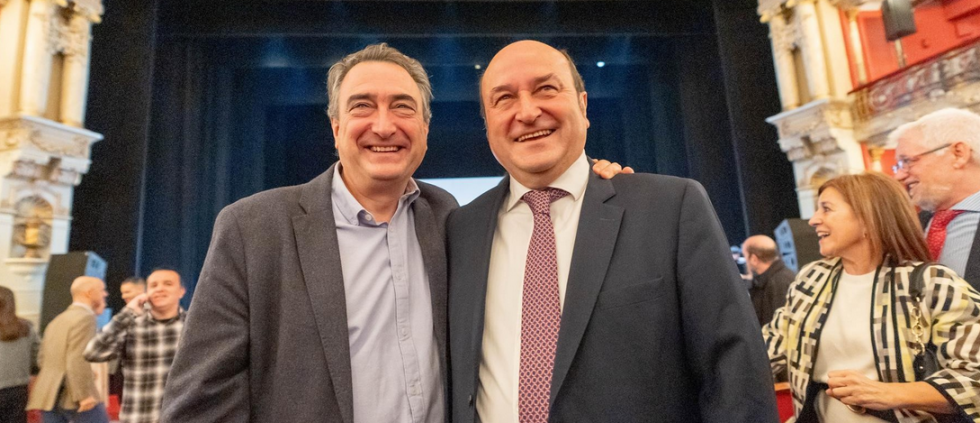"In a judgment, the well-crafted version is always more convincing than the truth."
- The day I met her, Hibai Arbide Aza talked about borders. He said that they are anti-democratic mechanisms that serve to expel people. Since then, almost two years have passed and more and more people are around that cannot cross borders.
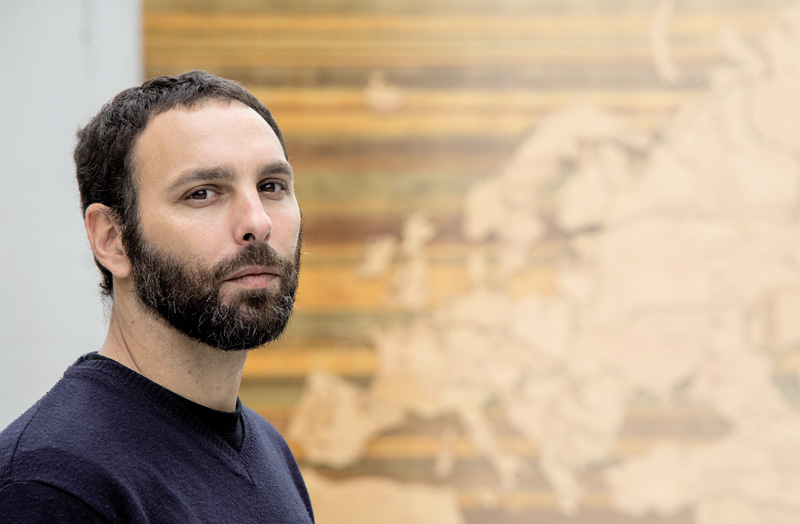
He studied law.
Yes. I wanted to learn political science, but a couple of people were in law and I found it more pragmatic. In principle, I didn't want to work as a lawyer, but I did nine years. First in a very small office and then in other offices: With Jaume Asens and the Layret collective.
How does political activism combine with law?
My activity has always been linked to a certain conception of the world. Sometimes, you are a militant lawyer who takes the right as a political field to act. Other times, instead, you're the advocate of the militants, you protect the people who fight.
In 2014, I listened to him at a round table at the Museum of San Telmo, and I remember what Ecuadorian lawyer Eli Vásquez said there.
Yes, Eli distinguished two types of lawyers: human rights lawyers and steelworkers’ attorneys. Human rights lawyers use mechanisms such as the European Court of Human Rights to obtain concrete case law: they adopt the frameworks that offer the greatest guarantee (generally international) and then try to translate their results into the field. Eli, however, proposed another way: to hack the law. I do not think they are contradictory paths.
Does it also depend on the case?
Completely. In order to get to Strasbourg, you need a specific infrastructure, a long-distance case. In the Basque Country, the Basque Left has had such cases, but, in general, any political institution can take it more easily along that road, if it has a basic political infrastructure. Here they have been condemned for years and, therefore, thought has also been given to this concept: Let them come to Strasbourg and establish what the Spanish State should do. After that, Strasbourg has often laid down the framework and the Spanish State has ignored it.
Eli works with trans activists and sex workers, who are organized but do not have this infrastructure to go to the Latin American Court of Human Rights. When you're working with more precarious customers, it's about looking for shortcuts to get the results as soon as possible.
Do you remember any case in which that shock is reflected?
Well, they denounced the self-managed social center Patio Marvels in Madrid and asked for eviction. We could take two paths. One, the maximalist: we could be placed within the framework of human rights and claim the right to enjoy this space. But we use the second path. We found that only one group had been denounced in the complaint, and that there were 21 associations in the Patio Marvels space, so only one of them had to leave the place. Patio Marvels lost his judgment, but they couldn't drive out the others.
It would have been much nicer to recognize the right to be in space, but with that strategy we would lose space, while the other was more useful to continue working on the political objectives of space. However, space was lost a few years later. These victories are often provisional.
What have you learned as a lawyer?
No one tells the truth in the judgments. The truth is too complex, you can't get into judgment, there are too many nuances and you have to adapt them to build the latest version. A well-crafted version is always more convincing than the truth. That does not mean that it always lies in the important aspects, but the law is a code to explain reality, and in that sense it is arbitrary.
Law doesn't tell you what you can do and what you can't do, but it sets out what consequences you'll have if you do something that the law doesn't allow. On the other hand, the law is always applied on the basis of the correlation of forces at a given time.
They often ask you if something is legal and if it can be done. That is not the same thing. There are people who can do illegal things and not suffer consequences, and others who, being “innocent”, are forced to bear the burden of law.
He has worked in Barcelona. How and what have you noticed the change of city in your activity?
Administrative law has been gaining more and more strength within repressive strategies. For years, the power resorted to criminal law to punish the conduct it considered dangerous. In recent years, however, several laws have been enacted, including that of the Ordinance on Civility and that of the Moorish Law. Fines have been imposed, and in this area you have no guarantees of trial. Criminal law can be the subject of much criticism, although at least the right to defence is guaranteed. In administrative law, when an agent of the Barcelona Urban Guard says that you have committed a crime, you yourself must prove that it is not true.
Some groups have been removed from public spaces by administrative law, and not only that, but have used this same mechanism for neighborhood gentrification, along with other strategies that, of course, cannot be realized in a single instrument.
In any case, you left the law, you left Barcelona and you went to work as a journalist in Greece.
I have always liked to write, and I was already doing so, on one and the other occasion. I understood that I often had more desire to have the matter explained to me than to have it treated as a lawyer. Then I went to Greece: I didn't know the language, I didn't have titles, and I started writing more often. In addition, I found a very interesting moment to be a journalist. Syriza won the elections, a referendum was held, the third memorandum was held ... Part of it was easy to start working professionally, and I've been very lucky.
You arrived there in 2014. What did you find?
I knew the country a little bit. My colleague is from here and in recent years I have gone several times. I found a country deeply hit by the crisis: a missing middle class, very high levels of poverty... However, it was a different time, a time of hope.
In 2015, the government did not lose it, but the people. Many people knew what was going on: a government against neoliberal Europe, for the first time, in an open institutional conflict. Many people supported Syriza, although he did not like Syriza, because they thought that one could think of another Europe.
And now ...
This climate exists, although it has been reduced. It is usually a simple reading and saying that street mobilizations have gone down. This is partly the case, but, basically, the way to mobilise has changed, it has not disappeared. The number of Greeks who have turned to the benefit of refugees, and not just the activists, is impressive. In my neighborhood, for example, there's a women's association. These are elderly women who have spent the whole winter making hats for refugees. The work costs as much as the work done on the beaches of Lesbos, and many people have done it spontaneously, without organizing. Despite the fact that many Greeks are in a very poor state, racism has not increased, as in Germany.
Why?
On the one hand, the Greeks identify with the fugitives: “That very Europe that has fascinated us is bothering the fugitives.” Moreover, in 1922, Turkey and Greece fought in the war. Greece lost, and many Greeks had to leave what is now Turkey and leave to what is now Greece. They traveled the same roads as the now fugitive ones, from Ismir to Lesbos. Half of the inhabitants of Lesbos are descendants of refugees, and it is not the same as in Euskal Herria: it is not that your grandparents went to Argentina, but that your parents came here, and that is what you are the fruit of.
The Greek right has said that the situation is not the same, since on that occasion the Greeks returned to the Greek capital. We interviewed an 82-year-old lady who had come back at the time and denied that reading: they were turned away because they were poor and called them Turks to insult them.
As a journalist, how do you position yourself?
It seems to me that objectivity does not exist and that it is more honest to state where each person writes from. This does not mean that the report has to be propaganda, I do not like this kind of work, even if I agree with the content. But ideological trends are always there: they can't be prevented, everyone has them, so it's better to recognize where you are from.
Examples?
If I make a report about fugitives, you always have to talk about the escapes, not just the volunteers. That is a political position and is not a pamphlet, let alone.
In this sense, hydraulic comparisons are very uncomfortable; fugitive waves, fugitive currents... It seems that we are talking about the ships communicated: here you close the border and the fugitives appear elsewhere, automatically. Obviously, if there were no war, things would not be that way, but fugitives are not a mere consequence of war, they have come because they have made some decisions, they are subject to their lives and their decisions.
You also look at feminism.
For me it is important, as well as being a subject, that feminism explain my writing, that it always conditions me, that it speaks of fugitives or precarious work. Let it be cross-sectional. Therefore, it is not a question of continuing reporting on refugee women, but of listening to what my feminist colleagues say about the issues that I work on and accepting the criticisms that they make to me.
Having said all that, I should like to make it clear that our work is not innocent. If I start seeing the reports I've done, I'm sure I'm going to do a lot of self-criticism and I hope to continue learning, but if you don't set an objective to yourself, you won't get closer.
He has said more than once that Greece is a laboratory in Europe.
Yes. It is a laboratory of austerity and neoliberalism, because the Greek debt is not an accounting mechanism, that is, the key is not how much money a country has and how much it owes. No, debt is a disciplinary mechanism. The creditors do not want the debt to be paid to them, but through debt the policies that a government can make are conditioned.
Let me give you an example. In the 2015 negotiations, Varoufakis offered to lower the salaries of Central Bank managers in Greece by 60%, and the troika rejected the proposal. On the contrary, they were required to lower the salaries of the administration rather than those of the administration. These are clearly political criteria.
They want above all to demonstrate through Greece that no other policy can be implemented. They can then use the precedent of Greece and do the same in other European countries.
Looking to the future, how do you see the situation?
The two situations in Greece, both the economic and the refugee crisis, are going to go in the long run.
And before that...?
To begin with, we need criticism and political movement. Solidarity is very important, of course. I would not like to make a dogmatic reading of the left and of solidarity as an empty charity. Thanks to this solidarity, the terrible living conditions of millions of people have been somewhat alleviated. If you improve the living conditions of a single person, that's always something. But that is not enough, and we have to ask for borders to be opened up, politically: it is not charity, it is a democratic requirement. It is a democratic right that everyone can move.
Zuzenbidea ikasi zuen, eta abokatu jardun, bederatzi urtez, Bartzelonan. Okupazioarekin eta migrazioarekin lotutako kasuetan lan egin du, batik bat. Gaur egun, Atenasen bizi da, eta bertako egoeraren berri ematen dihardu, buru-belarri. Besteak beste, Venezuelako Tele Sur katean eta Twitterren (@hibai_) jarrai dezakezue.
“Atenasen merkeak dira taxiak, ez dute halako konnotazio handi-mandirik, eta gidarien espektro politikoa oso da askotarikoa. Itzelak dira kazetaritza egiteko. Gidariarekin hitz egin dezakezu, eta hura, aldi berean, bestelako jende askorekin mintzatu da”.
“Beranduxe aurkitu dut kazetari bokazioa, 35 urte ingururekin. Hala ere, uste dut ondo etorri zaidala aurreko esperientzia, abokatu lana, kazetaritza egiteko oso lagungarria baita bestelako gauzetan ere ibili izana. Gainera, orain, adin honetan, seguru dakit hauxe egin nahi dudala”.
“Gauza mordoa daude kontatzeko, baina komunikabideek ez dute horiek kontatzeko baliabide materialik eskaintzen, eta erabaki politikoa da hori ere. Kazetari batek ezin du Idomenin hilabete bat eman, kotxea alokatu eta abar, erreportaje baten truke 50 euro ordaintzen badizkiote”.
"Ask for your turn and we'll join you," the willing and cheerful announcer who speaks from the studios tells the young correspondent who walks through the streets of Bilbao. The presenter immediately addressed the audience. "In the meantime, we are going to Pamplona..." They opened... [+]
I have to confess a sin here. Four years ago, I introduced a new habit into my life: on Sunday nights, I began to watch the ultra-right television channel CNews, which spreads continuous "information" like a cannon of shit. What was at first half an hour a week, has at any given... [+]
Martxoaren 14an Donald Trumpek agindu exekutibo bat sinatu zuen, hainbat berri agentziak jasotzen duten diru kopurua asko murrizteko. Kaltetuetako bat United States Agency for Global Media (USAGM) izan zen eta, ondorioz, Voice of America (VOA), Radio Free Europe/Radio Liberty... [+]
2022ko ekainaren 7an, Directa-k serie luze bateko lehen polizia infiltratuaren kasua argitaratu zuen. Martxoaren 5ean, Belen Hammad fikziozko izena erreta geratu zen, polizia-argotean dioten bezala. Jada hamar dira Directa, El Salto eta El Diario-k azken hiru urteetan argitara... [+]
USAIDen inguruko txolopotearen ondoren, espero beharrekoa zen. Baina, hala ere, urte askotan haien jarraitzaileak izan garenok, samin-puntu batekin hartu dugu albistea. Martxoaren 15ean, Trump administrazioak, kolpetik, erabat itxi baitu United States Agency for Global Media... [+]
Varsoviako Barrutiko Auzitegiak argudiatu du González jada ez dagoela Polonian, eta ezin dutela jakin noiz aterako den Errusiatik. Auzitegiak ez du kazetari nabarniztarraren aurkako bestelako prodezurarik abian jarriko.
Gaur abiatu da Bizi Baratzea Orrian kide egiteko kanpaina. Urtaro bakoitzean kaleratuko den aldizkari berezi honek Lurrari buruzko jakintza praktikoa eta gaurkotasuneko gaiak jorratuko ditu, formato oso berezian: poster handi bat izango du ardatz eta tolestu ahala beste... [+]
Alemaniako Poliziak asteleheneko gertakariaren arrazoiak "politikoak" zirela baztertu duen arren, 35 urteko Alexander Scheuermann Ring Bund talde neonaziko kide zen. Bi hildako eta hamar zauritu utzi dituen atentatuaren egileak sare sozialetan "gorroto mezuak"... [+]
Lan baldintzen "prekarietatea" salatzeko kontzentrazioa egin zuten asteartean egunkariaren egoitzaren aurrean. Abenduaren 2tik sindaura greban daude langileak eta mobizlizazioak "areagotzea" erabaki dute orain.
Urtea baino gehiago da Olatz Simonek –EITBko berriemailea Parisen, garaian–, orrialde hauetan bertan ohartarazi zigunetik Bruselak kazetariari lanbideaz erakusten dionaz. Eta halaxe joan gatzaizkio galdezka Amaia Portugali. Bruselan gure irrati publikoak duen... [+]
Langileek salatu dute zuzendaritzak ez diela lan baldintzen gaiari heldu nahi izan eta enpresak nahiago izan duela Gaztea Sariak ekitaldia bertan behera utzi, “horrek sortutako albo-kalte ekonomiko eta sozial guztiekin”, arazoari irtenbidea eman baino.
Joan den asteartean La Vanguardia-n argitaratutako artikuluan egin zuen proposamena Txema Montero abokatu bizkaitarrak. 30 urtez Deia egunkariko kolaboratzailea izan da eta lehenik hara bidali zuen bere artikulua, baina egunkariak ez zion argitaratu.
Hemendik aurrera egunkarian soilik "norbanakoen askatasuna eta merkatu librea" sustatzen dituzten iritziak jasoko direla adierazi du enpresaburuak. Iritzi artikuluen zuzendariak hedabidea utzi duela ere argitaratu du.









